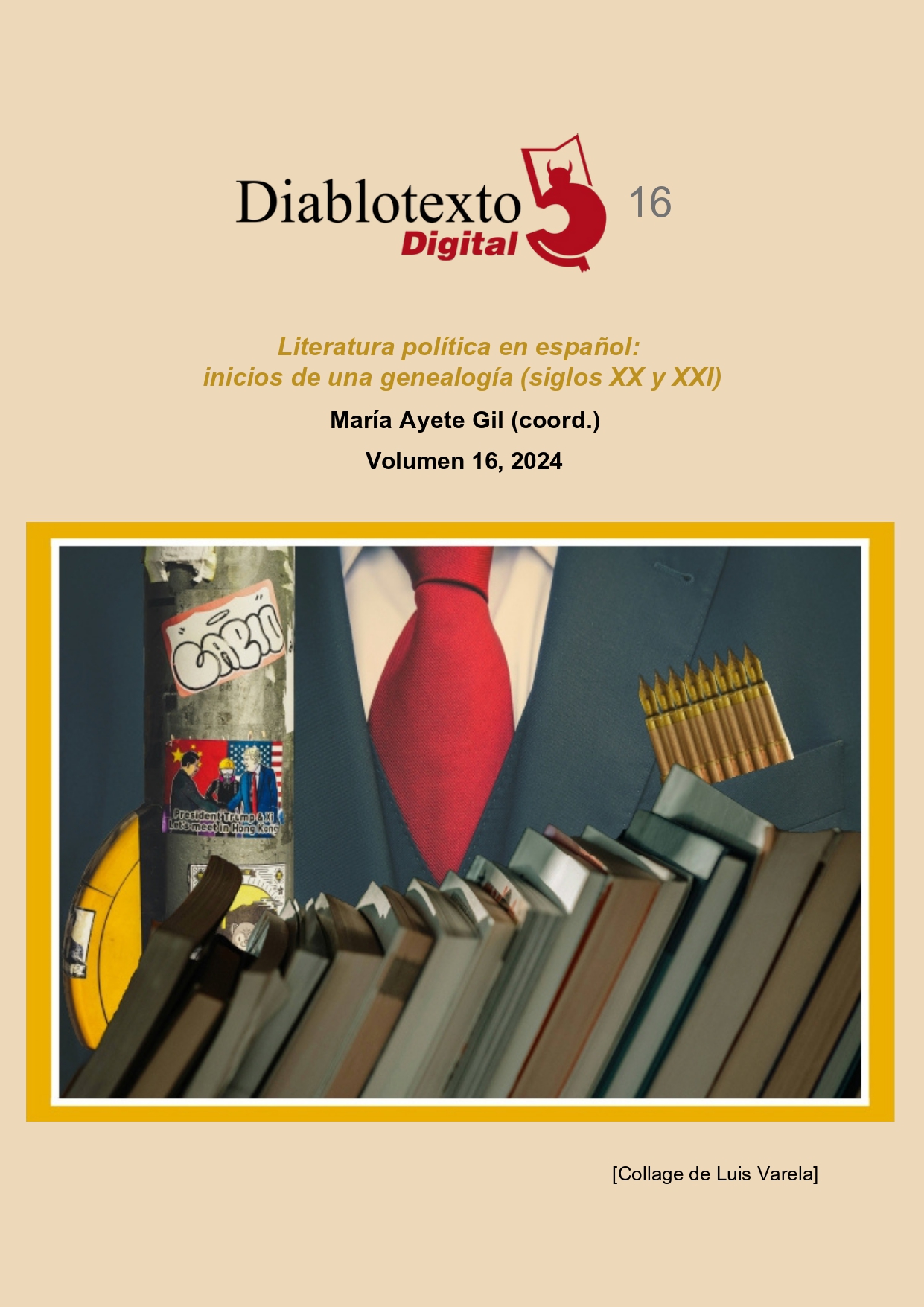Political Literature: The Beginnings of a Genealogy
DOI:
https://doi.org/10.7203/diablotexto.16.30014Keywords:
political literature; political novel; political poetry; political theatre Abstract
Abstract
What are we talking about when we speak of political literature? This text aims, first of all, to answer the question and does so starting from the absence —or confusion, at least— of a definition as such in the history of Spanish literature of the twentieth century. Tracing the appearances of the notion of politics associated with the noun 'literature' or 'novel', the work thus presents a reformulation of the syntagm that is based on the ideological consideration of all literary discourse and on the need to handle a concrete idea of politics, far from clichés and institutions. The second objective of the text is to open the doors to the possibility of a transnational genealogy of political literature.
 Downloads
Downloads
 References
References
ÁLAMO FELICES, Francisco (1996). La novela social española. Confrontación ideológica, teórica y crítica. Almería: Servicio de Publicaciones Universidad de Almería.
AYETE GIL, Maria (2023). Ideología, poder y cuerpo. La novela política contemporánea. Manresa: Bellaterra edicions.
BECERRA MAYOR, David (2021). Después del acontecimiento. El retorno de lo político en la literatura española tras el 15-M. Manresa: Bellaterra edicions.
BECERRA MAYOR, David (2015) (coord.). Convocando al fantasma. Novela crítica en la España actual. Madrid: Tierradenadie.
BLANCO AGUINAGA, Carlos et al. (1979). Historia social de la literatura española (en lengua castellana) III. Barcelona: Castalia
BLANCO AGUINAGA, Carlos et al. (1978). Historia social de la literatura española (en lengua castellana) I. Barcelona: Castalia
DÍEZ DE REVENGA, Francisco Javier (2012). La novela política. Novelistas españolas del siglo XXI y compromiso histórico. Valladolid: Universidad de Valladolid.
GIL CASADO, Pablo (1968). La novela social española (1942-1968). Barcelona: Seix Barral.
GÓMEZ DE LA SERNA, Gaspar (1971). Ensayos sobre literatura social. Madrid: Ediciones Guadarrama.
GOZALO I SALELLAS, Ignasi. (2016). “15-M, la lluvia que no cesa. Una relectura del acontecimiento contemporáneo”, 452ºF. Revista de Teoría de la Literatura y Literatura Comparada, vol. 15, pp. 54-70.
GRACIA, Jordi; RÓDENAS, Domingo (2011). Historia de la literatura española. 7: Derrota y restitución de la modernidad 1939-2010. Madrid: Crítica.
LAÍN CORONA, Guillermo; OAKNÍN, Mazal (2015) (eds.). Literatura política y política literaria en España. Del Desastre del 98 a Felipe VI. Berna: Peter Lang.
LÓPEZ-TERRA, Federico; AYETE GIL, Maria (2025). “Crisis de la representación y acontecimiento: hacia una teoría de la ficción 15M”. Altre Modernità. Rivista di studi letterari e culturali, n.º 33, en prensa.
MACHEREY, Pierre; ETIENNE, Balibar (1975). “Sobre la literatura como forma ideológica”. En Louis Althusser et al., Para una crítica del fetichismo de la mercancía. Madrid: Akal, pp. 23-46.
PERIS BLANES, Jaume (2018). “Cultura, literatura e imaginación política. La verosimilitud va a cambiar de bando”. En Jaume Peris (ed.), Cultura e imaginación política. México/París: RILMA 2/ADEHL, pp. 1-24.
RANCIÈRE, Jacques (2011). El malestar en la estética. Buenos Aires: Capital Intelectual.
RANCIÈRE, Jacques (2009). El reparto de lo sensible. Estética y política. Santiago de Chile: LOM Ediciones.
RODRÍGUEZ, Juan Carlos (2002). De qué hablamos cuando hablamos de literatura. Granada: Comares.
SANZ VILLANUEVA, Santos (1980). Historia de la novela social española (1942-75). Granada: Editorial Alhambra.
Downloads
Published
How to Cite
-
Abstract153
-
PDF (Español)66
Issue
Section
License
Licencia de reconocimiento de Creative Commons “Reconocimiento - No Comercia l- Sin Obra Derivada
Authors who publish with this journal agree to the following items:
The authors will keep their copyright and guarantee the journal the right of first publication of their work, which will be simultaneously subject to the Creative Commons license that allows third parties to share the work indicating its author and its first publication in the journal. The authors may adopt other non-exclusive license agreements to distribute the version of the published work (e.g., depositing it in an institutional telematic file or publishing it in a monographic volume), with an acknowledgment of its initial publication in this journal. The authors are allowed and encouraged to disseminate their work through the Internet (e.g., in institutional telematic archives or on their website) before and during the submission process, which can produce interesting exchanges and increase citations of the published work. (See Effect of Open Access)




